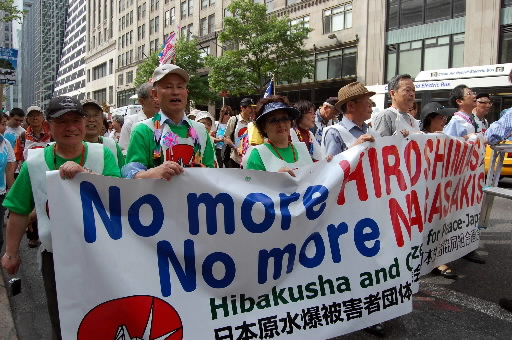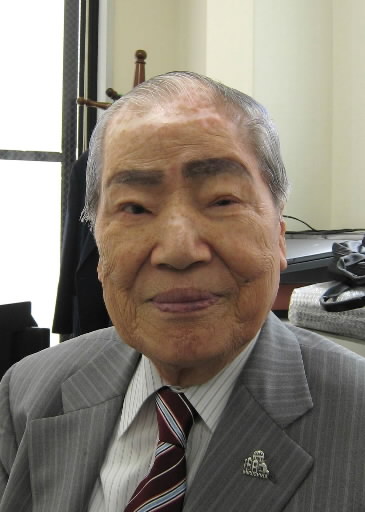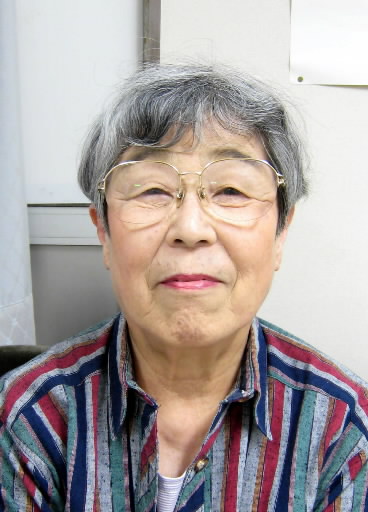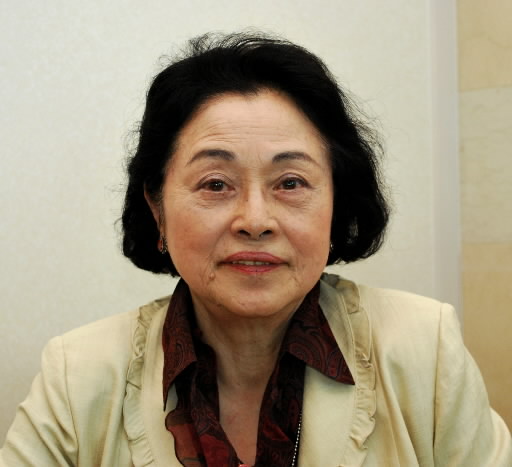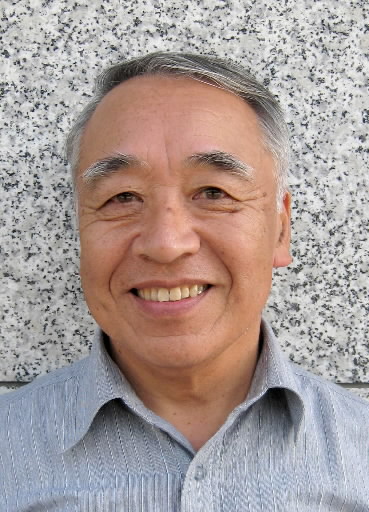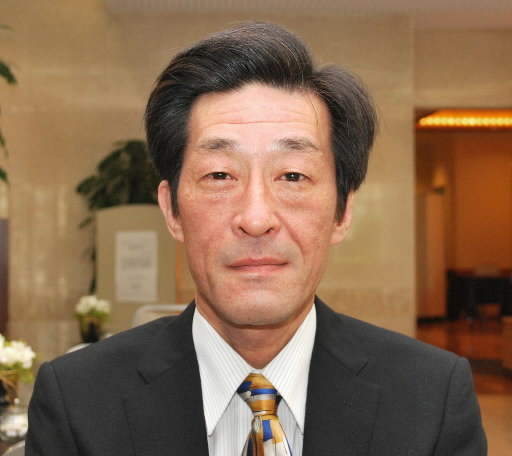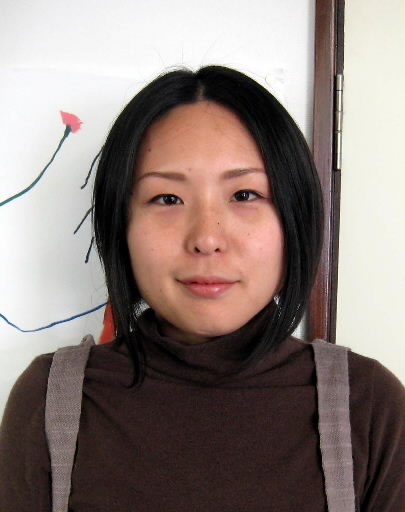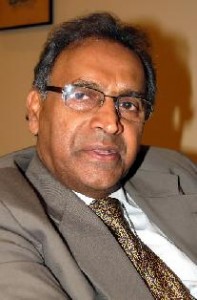Sympathy for nuclear abolition at midpoint of NPT Review Conference
May 22, 2010
by Junichiro Hayashi and Yoko Nitta, Staff Writers
The four-week Nuclear Non-proliferation Treaty Review Conference, which will continue through May 28, has reached the halfway mark. A contingent of 2,000 atomic bomb survivors and others from Japan, including about 100 representatives from Hiroshima, traveled to the United States to promote "a world without nuclear weapons." They timed their arrival to coincide with the opening of the conference, which is being held at United Nations Headquarters in New York. During their stay the members of the group recounted their experiences of the atomic bombing and conducted demonstrations. The Chugoku Shimbun asked the A-bomb survivors and other participants from Hiroshima who have returned to Japan about the response of those in the United States to their call for the abolition of nuclear weapons.
Sunao Tsuboi, 85, co-chairperson of the Japan Confederation of A- and H-bomb Sufferers Organizations
It is government representatives who are directly involved in the review conference. The role of A-bomb survivors and ordinary citizens is to monitor their activity and press them to take action. In order to help make the conference a success, we delivered petitions to U.N. Headquarters signed by citizens calling for the abolition of nuclear weapons. We are also holding an exhibition on the atomic bombing while the conference is proceeding.
I am concerned about whether or not the Hiroshima-Nagasaki Protocol being promoted by Mayors for Peace, which sets out a strategy for the abolition of nuclear weapons by 2020, will be put on the table for discussion at this conference. The Japanese government, as Japan is the only nation to have suffered nuclear attack, should be in a position to exercise its influence. I don't want our efforts to come to nothing.
Having seen four review conferences since 1995, there is one thing I feel strongly about. With people being exposed to radiation through the development of nuclear energy and the growing concern about nuclear proliferation, I feel the nuclear issue is broad and rapidly changing. So I think the review conference should be held annually rather than only once every five years.
Utako Tamaru, 77, atomic bomb survivor
This was my first trip to the United States. I was exposed to radiation when I came to Hiroshima after the bombing. I talked to people about this experience in front of United Nations Headquarters where the review conference is being held and in other locations. The Hiroshima that I saw with my father, who was an artist, and my younger brother had been completely destroyed, and columns of smoke from the burning of bodies could be seen here and there.
Some of those who listened to my story had tears in their eyes. As we sat and talked face-to-face I felt we understood each other. I passed out 300 flyers calling for the abolition of nuclear weapons to people on the street. I hope the people who took the flyers will be motivated to support our movement.
We also visited a nuclear test site in Nevada. We met with residents of the area who have reportedly suffered from the effects of exposure to radiation, and we heard that they are planning to build a peace museum. I'm thinking of sending them copies of sketches my father made of Hiroshima after the bombing. I'd also like to tell people about the seriousness of the effects of nuclear energy, which can even cause genetic damage.
Setsuko Morita, 77, atomic bomb survivor
I felt I widened my circle of friends. At the same time, I wasn't able to tell as many Americans as I had hoped to about my experience of the bombing. Because of the language barrier and time limitations, I couldn't take full advantage of the opportunity to talk with them. The review conference is a time for government representatives to engage in discussions. I wondered how much of a role we A-bomb survivors were really able to play.
But I was surprised by the eagerness with which students asked questions when I visited schools to talk about my experiences. I have a new dream now to promote further exchanges like that. At the A-bomb exhibition I met an A-bomb survivor who attended the former First Hiroshima Prefectural Girls' High School (now Minami High School) and who now lives in the United States. We also got support from local volunteers. So I made new connections.
I may not be around for the next conference five years from now. I renewed my resolve to continue to tell people about my A-bomb experience so we can leave the task of achieving nuclear abolition to the younger generation.
Seiji Takato, 69, experienced black rain
I want people to know what happened under the mushroom cloud, including the black rain. With that in mind I made my first trip to the United States. I wanted to tell people about my experiences myself. With the help of a friend I translated my account into English and gave a speech in English in a square in New York. All the people who were listening had serious expressions on their faces, but I regret that the language barrier prevented me from engaging in discussions with them.
I also participated in a march calling for the abolition of nuclear weapons. I felt that the demonstration took place because A-bomb survivors have continued to call for the abolition of nuclear weapons for 65 years. If the nuclear nations and other countries throughout the world don't recognize that we don't need nuclear weapons, it will be difficult to eliminate them. The experiences of Hiroshima and Nagasaki are of utmost importance. I can play a part in sharing those experiences with people both in Japan and overseas. I felt that very strongly on this trip to the United States.
Fumio Kiyomasa, 49, second-generation atomic bomb survivor
I spoke about my parents' experiences of the atomic bombing at two junior high and high schools in New York. The teachers were surprised at how seriously the students listened. I may not be able to convey the story of the bombing as well as a survivor, but I felt that I got my feelings across to them. I would like more second- and third-generation survivors to go to the United States for the next review conference.
This was my second trip to the United States. On my first trip five years ago some people said they would support the cause of the A-bomb survivors because they disliked President Bush. This time it seemed that more people were seriously addressing the problem of nuclear weapons head on. During the demonstration march, many people were waving to us and calling out their support for our efforts.
We can't take part in the decisions made by the conference, but citizens choose the politicians who will promote the abolition of nuclear weapons. I felt once again that I must tell people about my desire to eliminate nuclear weapons and enlist their support.
Erika Abiko, 31, director of the "Yes! Campaign Committee"
I was overwhelmed by the march in New York in which about 10,000 people from all over the world participated. There was tremendous excitement. I was taking pictures and uploading information to the Internet as I walked along with them. It's too bad the march wasn't covered by the news media in the United States.
In its speech at the review conference the Japanese government emphasized the motivation and enthusiasm of civil society and mentioned the Hiroshima-Nagasaki Protocol. Before going to the United States we asked the government to adopt the protocol at this conference. I feel certain that our request played no small part in that effort.
While in the United States I met A-bomb survivors who live there as well as young people from Europe. If we don't have a shared understanding of the sadness and frustration that nuclear weapons bring, there won't be widespread support for abolition. How much we keep pushing the Japanese government is also important. I'd like to promote better ties between the citizens of Hiroshima and use those ties as the driving force behind our call for nuclear abolition.
by Kohei Okata, Staff Writer
When young people in the United States heard the accounts of the experiences of the A-bomb survivors who traveled to the United States for the review conference they expressed strong opposition to nuclear weapons.
The Japan Confederation of A- and H-Bomb Sufferers Organizations is holding an exhibition on the first floor of United Nations Headquarters. After seeing the photos of the destruction and hearing the accounts of A-bomb survivors, Orie Cepeda-Willgerodt, a 13-year-old junior high school student from Brooklyn, expressed dismay at the inhumanity of the atomic bombing. She said she felt young people had an obligation to take action, such as gathering signatures on petitions, and call on the president to abolish nuclear weapons and to bring about world peace.
Forty-two A-bomb survivors were sent to the United States by the Japan Confederation of A- and H-Bomb Sufferers Organizations. They talked about their experiences of the bombing at the exhibition venue and also visited about 40 schools and other facilities in New York City and the surrounding area. One student at a public high school in Brooklyn said that, after hearing the account of a survivor, the atomic bombing had become more to him than just something in a textbook. He said he was hopeful that President Obama would take the lead in bringing about the "world without nuclear weapons" he has advocated.
Not only was the horror of the atomic bombing conveyed, there was also growing sympathy for the survivors and their stance of calling for reconciliation rather than revenge. Eva Vasques, 43, a native of Puerto Rico and a member of the teaching staff at a university in New York City heard Sunao Tsuboi and other members of the Japan Confederation of A- and H-Bomb Sufferers Organizations describe their experiences of the bombing. She said the A-bomb survivors had taught her that no one will benefit from continued retaliation and added that she was very impressed by their attitude.
by Yumi Kanazaki, Staff Writer, dispatched from New York
What is the significance of conveying the thoughts and feelings of the A-bomb survivors directly to the NPT Review Conference? The Chugoku Shimbun put this question to Jayantha Dhanapala, 71, president of the Pugwash Conferences on Science and World Affairs, who, along with Hiroshima Mayor Tadatoshi Akiba and others, gave a speech at the conference on May 7 as part of the presentation by non-governmental organizations (NGOs)..
In order for them to debate the issues of nuclear disarmament and nuclear non-proliferation, it is essential for government representatives to learn about the horror of nuclear weapons through the accounts of A-bomb survivors who are living witness to that horror and who are still suffering from the effects of the bombing 65 years on.
In particular, nuclear nations that make the self-serving assertion that nuclear weapons are essential to their national security must learn from the A-bomb survivors that nuclear weapons pose a threat to people's security. The presentations by NGOs provided an opportunity to do that.
But in reality it is difficult to bring about a turnaround in the intentions of the nuclear powers and in the direction of the conference merely by doing that because what government officials feel, at heart, does not necessarily have a direct impact on a nation's security policy.
But if, for example, the voices of the A-bomb survivors were conveyed through NGOs and the news media, their plea that nuclear weapons must never be used again, which is based on a sense of humanity, would be amplified many times over. That would put pressure on governments.
It is also significant that people from Japan and around the world gathered in New York, conducted demonstrations and brought with them petitions with the signatures of millions of people who are calling for nuclear abolition. I don't think there is any other conference where the voices of ordinary citizens carry such weight.
Jayantha Dhanapala
Born in 1938 in Sri Lanka. After entering the diplomatic service in 1965, served in various posts, including ambassador to the United Nations Office at Geneva, ambassador to the United States and U.N. under-secretary general. Presided over the 1995 NPT review conference. Assumed his current post in October 2007.
(Originally published May 17, 2010)
To comment on this article, please click the link below. Comments will be moderated and posted in a timely fashion. Comments may also appear in the Chugoku Shimbun newspaper.
The four-week Nuclear Non-proliferation Treaty Review Conference, which will continue through May 28, has reached the halfway mark. A contingent of 2,000 atomic bomb survivors and others from Japan, including about 100 representatives from Hiroshima, traveled to the United States to promote "a world without nuclear weapons." They timed their arrival to coincide with the opening of the conference, which is being held at United Nations Headquarters in New York. During their stay the members of the group recounted their experiences of the atomic bombing and conducted demonstrations. The Chugoku Shimbun asked the A-bomb survivors and other participants from Hiroshima who have returned to Japan about the response of those in the United States to their call for the abolition of nuclear weapons.
Put Hiroshima-Nagasaki Protocol on the conference table
Sunao Tsuboi, 85, co-chairperson of the Japan Confederation of A- and H-bomb Sufferers Organizations
It is government representatives who are directly involved in the review conference. The role of A-bomb survivors and ordinary citizens is to monitor their activity and press them to take action. In order to help make the conference a success, we delivered petitions to U.N. Headquarters signed by citizens calling for the abolition of nuclear weapons. We are also holding an exhibition on the atomic bombing while the conference is proceeding.
I am concerned about whether or not the Hiroshima-Nagasaki Protocol being promoted by Mayors for Peace, which sets out a strategy for the abolition of nuclear weapons by 2020, will be put on the table for discussion at this conference. The Japanese government, as Japan is the only nation to have suffered nuclear attack, should be in a position to exercise its influence. I don't want our efforts to come to nothing.
Having seen four review conferences since 1995, there is one thing I feel strongly about. With people being exposed to radiation through the development of nuclear energy and the growing concern about nuclear proliferation, I feel the nuclear issue is broad and rapidly changing. So I think the review conference should be held annually rather than only once every five years.
Sympathetic response to account of A-bomb experience
Utako Tamaru, 77, atomic bomb survivor
This was my first trip to the United States. I was exposed to radiation when I came to Hiroshima after the bombing. I talked to people about this experience in front of United Nations Headquarters where the review conference is being held and in other locations. The Hiroshima that I saw with my father, who was an artist, and my younger brother had been completely destroyed, and columns of smoke from the burning of bodies could be seen here and there.
Some of those who listened to my story had tears in their eyes. As we sat and talked face-to-face I felt we understood each other. I passed out 300 flyers calling for the abolition of nuclear weapons to people on the street. I hope the people who took the flyers will be motivated to support our movement.
We also visited a nuclear test site in Nevada. We met with residents of the area who have reportedly suffered from the effects of exposure to radiation, and we heard that they are planning to build a peace museum. I'm thinking of sending them copies of sketches my father made of Hiroshima after the bombing. I'd also like to tell people about the seriousness of the effects of nuclear energy, which can even cause genetic damage.
Surprised by students' eagerness to ask questions
Setsuko Morita, 77, atomic bomb survivor
I felt I widened my circle of friends. At the same time, I wasn't able to tell as many Americans as I had hoped to about my experience of the bombing. Because of the language barrier and time limitations, I couldn't take full advantage of the opportunity to talk with them. The review conference is a time for government representatives to engage in discussions. I wondered how much of a role we A-bomb survivors were really able to play.
But I was surprised by the eagerness with which students asked questions when I visited schools to talk about my experiences. I have a new dream now to promote further exchanges like that. At the A-bomb exhibition I met an A-bomb survivor who attended the former First Hiroshima Prefectural Girls' High School (now Minami High School) and who now lives in the United States. We also got support from local volunteers. So I made new connections.
I may not be around for the next conference five years from now. I renewed my resolve to continue to tell people about my A-bomb experience so we can leave the task of achieving nuclear abolition to the younger generation.
Sensed impact of continuing calls for nuclear abolition
Seiji Takato, 69, experienced black rain
I want people to know what happened under the mushroom cloud, including the black rain. With that in mind I made my first trip to the United States. I wanted to tell people about my experiences myself. With the help of a friend I translated my account into English and gave a speech in English in a square in New York. All the people who were listening had serious expressions on their faces, but I regret that the language barrier prevented me from engaging in discussions with them.
I also participated in a march calling for the abolition of nuclear weapons. I felt that the demonstration took place because A-bomb survivors have continued to call for the abolition of nuclear weapons for 65 years. If the nuclear nations and other countries throughout the world don't recognize that we don't need nuclear weapons, it will be difficult to eliminate them. The experiences of Hiroshima and Nagasaki are of utmost importance. I can play a part in sharing those experiences with people both in Japan and overseas. I felt that very strongly on this trip to the United States.
More people now considering issues head on
Fumio Kiyomasa, 49, second-generation atomic bomb survivor
I spoke about my parents' experiences of the atomic bombing at two junior high and high schools in New York. The teachers were surprised at how seriously the students listened. I may not be able to convey the story of the bombing as well as a survivor, but I felt that I got my feelings across to them. I would like more second- and third-generation survivors to go to the United States for the next review conference.
This was my second trip to the United States. On my first trip five years ago some people said they would support the cause of the A-bomb survivors because they disliked President Bush. This time it seemed that more people were seriously addressing the problem of nuclear weapons head on. During the demonstration march, many people were waving to us and calling out their support for our efforts.
We can't take part in the decisions made by the conference, but citizens choose the politicians who will promote the abolition of nuclear weapons. I felt once again that I must tell people about my desire to eliminate nuclear weapons and enlist their support.
Ties between citizens as driving force
Erika Abiko, 31, director of the "Yes! Campaign Committee"
I was overwhelmed by the march in New York in which about 10,000 people from all over the world participated. There was tremendous excitement. I was taking pictures and uploading information to the Internet as I walked along with them. It's too bad the march wasn't covered by the news media in the United States.
In its speech at the review conference the Japanese government emphasized the motivation and enthusiasm of civil society and mentioned the Hiroshima-Nagasaki Protocol. Before going to the United States we asked the government to adopt the protocol at this conference. I feel certain that our request played no small part in that effort.
While in the United States I met A-bomb survivors who live there as well as young people from Europe. If we don't have a shared understanding of the sadness and frustration that nuclear weapons bring, there won't be widespread support for abolition. How much we keep pushing the Japanese government is also important. I'd like to promote better ties between the citizens of Hiroshima and use those ties as the driving force behind our call for nuclear abolition.
Young people moved by A-bomb accounts and displays
by Kohei Okata, Staff Writer
When young people in the United States heard the accounts of the experiences of the A-bomb survivors who traveled to the United States for the review conference they expressed strong opposition to nuclear weapons.
The Japan Confederation of A- and H-Bomb Sufferers Organizations is holding an exhibition on the first floor of United Nations Headquarters. After seeing the photos of the destruction and hearing the accounts of A-bomb survivors, Orie Cepeda-Willgerodt, a 13-year-old junior high school student from Brooklyn, expressed dismay at the inhumanity of the atomic bombing. She said she felt young people had an obligation to take action, such as gathering signatures on petitions, and call on the president to abolish nuclear weapons and to bring about world peace.
Forty-two A-bomb survivors were sent to the United States by the Japan Confederation of A- and H-Bomb Sufferers Organizations. They talked about their experiences of the bombing at the exhibition venue and also visited about 40 schools and other facilities in New York City and the surrounding area. One student at a public high school in Brooklyn said that, after hearing the account of a survivor, the atomic bombing had become more to him than just something in a textbook. He said he was hopeful that President Obama would take the lead in bringing about the "world without nuclear weapons" he has advocated.
Not only was the horror of the atomic bombing conveyed, there was also growing sympathy for the survivors and their stance of calling for reconciliation rather than revenge. Eva Vasques, 43, a native of Puerto Rico and a member of the teaching staff at a university in New York City heard Sunao Tsuboi and other members of the Japan Confederation of A- and H-Bomb Sufferers Organizations describe their experiences of the bombing. She said the A-bomb survivors had taught her that no one will benefit from continued retaliation and added that she was very impressed by their attitude.
Interview with Jayantha Dhanapala, president of the Pugwash Conferences
by Yumi Kanazaki, Staff Writer, dispatched from New York
What is the significance of conveying the thoughts and feelings of the A-bomb survivors directly to the NPT Review Conference? The Chugoku Shimbun put this question to Jayantha Dhanapala, 71, president of the Pugwash Conferences on Science and World Affairs, who, along with Hiroshima Mayor Tadatoshi Akiba and others, gave a speech at the conference on May 7 as part of the presentation by non-governmental organizations (NGOs)..
In order for them to debate the issues of nuclear disarmament and nuclear non-proliferation, it is essential for government representatives to learn about the horror of nuclear weapons through the accounts of A-bomb survivors who are living witness to that horror and who are still suffering from the effects of the bombing 65 years on.
In particular, nuclear nations that make the self-serving assertion that nuclear weapons are essential to their national security must learn from the A-bomb survivors that nuclear weapons pose a threat to people's security. The presentations by NGOs provided an opportunity to do that.
But in reality it is difficult to bring about a turnaround in the intentions of the nuclear powers and in the direction of the conference merely by doing that because what government officials feel, at heart, does not necessarily have a direct impact on a nation's security policy.
But if, for example, the voices of the A-bomb survivors were conveyed through NGOs and the news media, their plea that nuclear weapons must never be used again, which is based on a sense of humanity, would be amplified many times over. That would put pressure on governments.
It is also significant that people from Japan and around the world gathered in New York, conducted demonstrations and brought with them petitions with the signatures of millions of people who are calling for nuclear abolition. I don't think there is any other conference where the voices of ordinary citizens carry such weight.
Jayantha Dhanapala
Born in 1938 in Sri Lanka. After entering the diplomatic service in 1965, served in various posts, including ambassador to the United Nations Office at Geneva, ambassador to the United States and U.N. under-secretary general. Presided over the 1995 NPT review conference. Assumed his current post in October 2007.
(Originally published May 17, 2010)
To comment on this article, please click the link below. Comments will be moderated and posted in a timely fashion. Comments may also appear in the Chugoku Shimbun newspaper.

